The weekend just gone saw one of the largest literary festivals in Europe take place in Lyon. Quais du Polar brought together 70,000 crime fiction fans, and nearly 100 authors from over 20 countries. Over 30,000 books were sold and signed on the spot – where else will you find such a big event devoted to the genre we love? I was there too, and have come back full of ideas and inspiration. My report covers the event in eight quotes covering not just pearls of wisdom delivered during the writer panels at Quais du Polar, but also personal conversations I had with authors as I went around the show. Yes, it took place in France, but let’s start with an old favourite of ours from Scotland…
1 – “No matter where in the world, readers have so much more in common than they might think.”
–Val McDermid
Quais du Polar brought together people of many nationalities, and one theme was how readers engage with works by authors from faraway countries and also to the cultures described in their books. Perhaps it’s because crime fiction deals with matters of life and death, which are common to us all. Yet, at the same time, it is cultural differences that keep things interesting. French publishers seem more willing to translate debut novels and invite first-time authors to conferences. A rather bewildered looking Barry Gornell, whose debut The Healing of Luther Grove came out in 2012, admitted that Quais du Polar was his first crime fiction festival. Writers from Russia, Peru, Costa Rica and El Salvador have found themselves published in France before the US or the UK. On the other hand, Louise Penny’s Quebecois publisher was telling us that it was only after her books were translated into French for the market in Quebec that publishers in France took notice.
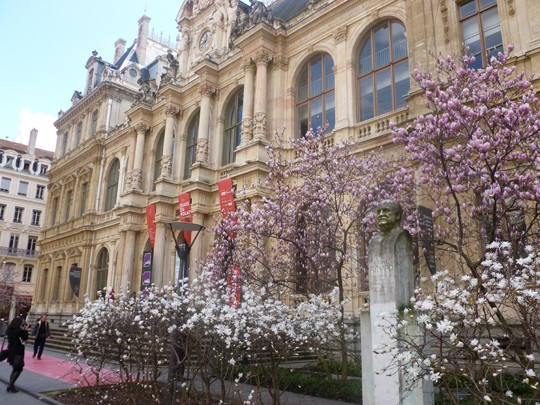 2 – “How beautiful to see queues of happy readers under the magnolias and such love for the printed word!”
2 – “How beautiful to see queues of happy readers under the magnolias and such love for the printed word!”
–Sean French (of husband and wife writing team Nicci French)
Writers from abroad expressed their amazement at the French appetite for crime fiction. People still buy real books here and ebooks haven’t quite caught on. Fans are enthusiastic about seeing their favourite writers eyeball-to-eyeball, according to Val McDermid. Sean French and Nicci Gerrard couldn’t get over the queues to get into the main venue itself, let alone each of the panel conferences. “Queues to talk about books? We’ve only ever seen such queues at Disneyland,” she said. Authors at the event paid tribute also to the unflagging enthusiasm and knowledge of the booksellers in the main hall. The sheer number of simultaneous signings meant that some writers were at times literally cornered – spare a thought for poor Tom Rob Smith who had the incredibly popular Michael Connelly just behind him and was virtually trampled by hordes of noisy fans.
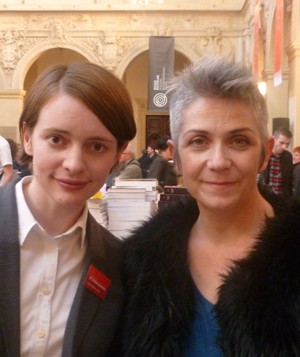
Emily St John Mandel (left) with Denise Mina.
3 – “Noir looks at the margins of society, but the very notion of a ‘margin’ is political, so noir is political.”
–Emily St John Mandel
The Canadian author made this statement at a panel on the Two Americas, where she was joined by Michael Connelly (USA), Leonardo Padura (Cuba), Paulo Lins (Brazil) and Paco Ignacio Taibo II (Mexico). The North Americans had some trouble getting a word in edgeways, given the storytelling eloquence and digressions of the Latin American contingent, but they were all in agreement that by its nature crime fiction is an arena for politics and social critique. The Central and South American writers talked about how they are able to reflect changes in their countries by focusing on families, and on life at the edges of society. The violence, poverty and absurd policies in some South American countries mean that reality can be more extreme than anything done in fiction. As the Mexican author Taibo II pointed out, crime authors have the potential to portray a higher degree of truth about life because they can get into the minds of people in ways journalists can’t. Former journalist Michael Connelly was asked if he plans to retire Harry Bosch, but he promised the character would be with him even on his deathbed, and talked a bit about the TV adaptation of the series.
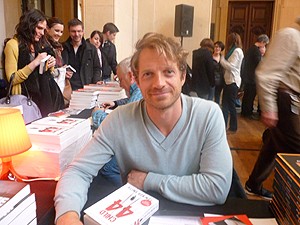
Tom Rob Smith with Child 44.
4 – “History is fascinating, but crime keeps me honest.”
–Attica Locke
During a panel on historical crime fiction Attica Locke talked about her approach to research and writing. “The beauty of the crime novel is that if you have a dead body on page two, you somehow have to wrap it up and can’t wallow too much in your detailed period descriptions,” she said. Her book The Cutting Season was one of my Top 5 Books of 2012 and is set in the present day on a plantation that was worked by slaves generations ago.
We’ve just reviewed panelist Michel Bussi’s After the Crash, his first novel to be translated into English. Before that he wrote about his native Normandy and how it has been traumatised and forever changed by the D-Day landings. He was joined by Tom Rob Smith whose Child 44 was the first in a trilogy set in the Stalinist Soviet Union, and by Yasmina Khadra (possibly the first male crime author to take on a feminine pseudonym) who once ran to be the president of Algeria and has written hugely thought provoking thrillers about religious fundamentalism and terrorism in North Africa and the Middle East. They all revealed different approaches to research and how much they felt was appropriate for a good historical crime novel, and agreed that you have to wear your knowledge lightly and not let it interfere with telling a good story.
5 – “I didn’t set out to write crime fiction, but if you have a dead body in your book it must be crime.”
–Emily St John Mandel
This theme came up time and again at Quais du Polar – so many authors consider themselves accidental crime writers. It seems most novelists set out to the write the book they want to write, and genre designation happens when marketing strategy takes over. Kishwar Desai said her novels were labelled ‘social thrillers’ in India because crime fiction had no tradition there. Ian Rankin (interviewed here) admitted that he searched for his first book in the literary fiction sections of bookshops. Even Elizabeth George, who started writing at the age of seven, came to crime fiction via a long, circuitous route. It was only when she had to teach a class on crime novels and deconstruct them for her students that she realised she might be able to write one herself. Many writers also mentioned the growing tendency to blur the lines between genres, with authors from other genres trying their hand at crime. Ian Rankin said that crime fiction is in rude health because of the quality of contemporary crime writers, the seriousness of their intent and their efforts to produce books that ask big questions and stay with you long beyond a flight or a train journey.
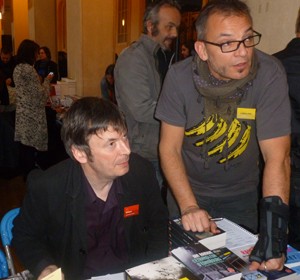
Ian Rankin signs books for fans.
6 – “There’s no tradition of crime writing in Scotland, so you’re free to create your own.”
–Ian Rankin
Under the tongue-in-cheek title The Passionate Thistle, Ian Rankin and Val McDermid had a very humorous and politicised conversation about what it means to be Scottish, the referendum, the 2015 general election, and the history of crime writing in Scotland. They contrasted England’s Golden Age of crime with the far more Gothic style of classic Scots authors like Robert Louis Stevenson. Scottish readers, they said, had trouble identifying with the well-bred, small village atmosphere of Agatha Christie. It was William McIlvaney who realised that urban landscapes, the Scottish way of life and street language could be represented in fiction. “McIllvaney opened the door a crack, Ian and I pushed it a little wider, and then there was a tidal wave of young authors behind us,” said Val McDermid.
Ian Rankin was at pains to point out that Tartan Noir is a bit of a marketing ploy. Although Scottish crime fiction has a reputation for being gritty, full of serious social commentary and very dark, there are also books in very different styles, from Alexander McCall Smith’s gentle tales of detection in Botswana to Christopher Brookmyre’s black comedy novels.
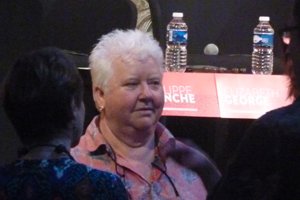
Val McDermid keeps an eye on things.
7 – “I’m a big fan of smell on the page – it’s the most vivid of the senses.”
–Saul Black
Saul Black is actually the pseudonym of Glen Duncan, author of The Killing Lessons. He was on a panel with the provocative title From Union Jack to Union Black. It wasn’t about race politics but about the rebirth of crime fiction in the UK after a comparatively quiet period in the 1970s and 80s. He was joined by Nicci Gerrard and Sean French (who write together as Nicci French), Val McDermid and Elizabeth George. They talked about how important setting is in crime fiction and how we need to appeal to all the senses when describing it, particularly the oft-neglected but evocative sense of smell (hence Saul Black’s quote). By the 1980s, crime fiction in the UK had turned a little stale and was divided into cosy village crime and traditional police procedurals. The latter were usually set in London or the Home Counties. Then there was a dramatic shift – Northern towns and working class people made their appearance and reinvigorated the genre.
There were some surprises when the authors were asked about their literary influences. Who’d have guessed Val McDermid’s first love was The Chalet School series or that Elizabeth George made the pilgrimage to Prince Edward Island to see the setting for Anne of Green Gables? Saul Black’s choice? The World According to Garp.
8 – “How can you create a charismatic detective in countries where people fear, distrust, even hate the police?”
–Dror Mishani
The final panel I went to introduced four writers from countries that are not widely known for their crime fiction – Yana Vagner from Russia, Daniel Quiros from Costa Rica, Kishwar Desai from India and Dror Mishani from Israel. Vagner and Quiros are young debut novelists who have only just been translated into French, while Kishwar and Dror have each had two or three novels published and translated. The key thing these authors have in common is that they all come from places with very little tradition of crime fiction. In their countries the police are seen as corrupt, unreliable, brutal and dishonest. There’s no private detective tradition, so that can’t be a source of characters either. The solution? These writers have tried to create alternative heroes. Vagner wrote about a family trying to escape a global flu epidemic, and Quiros a disillusioned revolutionary who has retired to Costa Rica after his involvement in Nicaragua’s civil war. Desai’s novels feature single mother and social worker Simran Singh, tackling hot topics in Indian society. Meanwhile, Mishani’s character Avraham Avraham is in fact a police officer, but an overly naive and idealistic one. He searches for innocence rather than guilt.
Of course, Quais du Polar is a huge event so there were plenty of other exciting attractions and authors. I missed out on talking to Gunnar Staalesen, Don Winslow and Dominique Manotti, and didn’t witness the dialogue between John Grisham and Michael Connelly. There was even a giant Cluedo-style investigation held for young and old alike, which took in some of the most picturesque neighbourhoods in Lyon.
Quais du Polar takes place annually at this time of year, so you might want to plan a holiday for it in 2016 – there are simultaneous translations into English in all the venues. For more dates on the crime fiction calendar, visit our Events page. Read our report on the 2013 Quais du Polar here.









Great post. It’s a real homage to the festival which is truly a happy fest for crime fiction lovers.
And yes, the French read a lot of crime fiction, mostly in paperbacks because ebooks aren’t cheaper anyway and paperbacks can be lent.
And crime fiction books are books you read once and pass on to someone else.
Emma